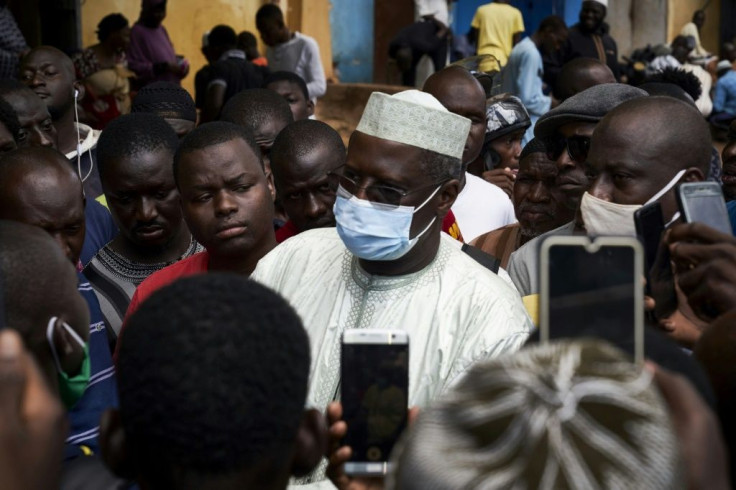Mali Protest Leader Urges Calm After Deadly Unrest
A Malian protest leader called for calm Sunday after four more people were killed during demonstrations calling for President Ibrahim Boubacar Keita's resignation, the West African country's worst civil unrest in years.
Bloody demonstrations rocked the capital Bamako on Friday and Saturday, with witnesses saying that security forces fired live rounds during clashes with protesters.
The atmosphere remained tense on the streets of Bamako on Sunday, as hundreds of people converged on the Badalabougou district for the funerals of four people killed in the violence.

In the face of the heightened tensions, Keita had announced he would dissolve the poor Sahel country's constitutional court, the focus of anger since it overturned provisional results for parliamentary elections earlier this year.
Protests in several cities on Friday descended into violence in which at least three people were killed.
Fresh clashes broke out on Saturday as protesters took to the streets of Bamako, angered by a long-running jihadist conflict, economic woes and perceived government corruption.

Four civilians -- including a 15-year-old and 17-year-old -- were killed overnight Saturday, a hospital official told AFP on condition of anonymity.
An emergency official at a large hospital in Bamako, however, told AFP the actual death toll since Friday stood at 11 not seven.
Six opposition figures have been detained in recent days, of whom one was released late Saturday, as the government cracked down on the June 5 Movement, an opposition alliance tapping into the deep-seated nationwide frustration.

But lawyer Alfifa Habib Kone said around 20 opposition members had been arrested since Friday.

The movement's leading figure, influential imam Mahmoud Dicko, tried to tamp down the tensions on Sunday.
"I once again call on the youth of Mali to show restraint and calm," Dicko told AFP shortly before speaking at a funeral.
"We can truly find and obtain what we want (through) patience (and) good behaviour," he said.

"But the struggle continues," Dicko said, adding that Mali's "endemic corruption (is also) bringing our country to its knees."
In a video broadcast earlier on social media, Dicko said: "Do not set fire to petrol stations or this district. Calm down, please! Calm down!"
He had recorded the video at his mosque, the scene of especially violent clashes at the weekend.

While the known death toll is currently seven, Dicko's supporters, echoing the emergency official, have said the total is higher, posting videos resembling scenes of war.
In the videos, at least two dead men can be seen lying in pools of blood, while others have bullet wounds. Shots can be heard at regular intervals in the distance.
"You are killing Malians in the mosque with live ammunition. The mosque is on fire," said a man in one the videos, which could not be independently verified.
On Sunday, hundreds crowded around the mosque, walking over spent bullet shells, rubble and the remains of torched tires.
Opposition leaders who have not yet been arrested now appear to be in hiding.
Fearing that Dicko might be arrested like other leaders of the movement, his supporters erected barricades on Sunday "in case the police return," one of them said.
Clashes have also been reported outside the home of the constitutional court's president Manassa Danioko, a focus of public anger.
Following a long-delayed parliamentary poll in March -- which Keita's party won -- the court overturned the provisional results for about 30 seats, which meant several members of Keita's party were elected.
This ruling is widely believed to have ignited the crisis.
The 75-year-old president, in power since 2013, said Saturday he had revoked the nominations of all remaining members of the constitutional court so that new judges could be appointed from next week.
Since the outrage that followed the parliamentary election, a disparate group of religious leaders, political and civil society members have joined forces to ramp up pressure on Keita.
Its leaders have called for "civil disobedience", including the non-payment of fines and blocking entry to state buildings.
It blames those in power for the violence, a rarity in Bamako.
Thousands of soldiers and civilians have been killed and hundreds of thousands of people have been forced to flee their homes.
French Defence Minister Florence Parly said Sunday that a joint EU special ops force formed to back Mali's fight against jihadist groups would begin to deploy on Wednesday.
A first batch of around 100 French and Estonian troops will be joined later by contingents from the Czech Republic and Sweden, Parly told the French daily La Croix, adding that Italy may also take part.




















